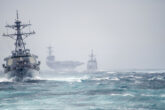December 03, 2014
When Superiority Goes Wrong: Science Fiction and Offset Strategies
For all our talk about the need for military technical superiority, what if pursuit of that goal becomes our downfall? A couple of weeks ago, Bill Sweetman from Aviation Weekly and I were talking about technology development issues and the Pentagon’s new offset strategy, the Defense Innovation Initiative. During the conversation he mentioned an Arthur C. Clarke story, Superiority, from 1951 that reminded him of some of our current challenges. Being the nerd that I am, I read it that evening with high hopes.
The story is great: It’s short and you should all read it. I’ll unpack it in a moment, but I’d like to pause for a second and consider the role of science fiction in military technology thinking. Why would I automatically assume that a science fiction short story from 63 years ago would be useful today?
Most defense nerds love science fiction. Peter Singer famously explored this relationship in Wired for War — drawing out the relationship between the technologists behind unmanned weapons system development and the science fiction that inspired them. The New America Foundation recently hosted a daylong conference, headlined by Neal Stephenson, that sought to re-focus science fiction on providing inspiration to today’s scientists and engineers. August Cole, of the Atlantic Council’s Art of Future Warfareproject, and Peter Singer will publish Ghost Fleet: A Novel of the Next World War next year. And, well, this is how Lt Col Dan Ward writes his books.
Read the full article at War on the Rocks.
More from CNAS
-
How Trump Will Change the World
Trump has won the chance to determine U.S. national security policy and will wield the impressive power embodied in the men and women now waiting to work for him....
By Peter Feaver
-
More than the Sum of its Parts: Developing a Coordinated U.S.-Australian Response to Potential Chinese Aggression
If China engaged in a war of aggression, the United States, Australia, and other nations would not have much time to develop a coordinated response....
By Stacie Pettyjohn
-
To Focus on China, U.S. Needs to Wean off Europe and Middle East Missions
If the United States cannot rebalance its military focus toward the Indo-Pacific it risks expediting Chinese aggression in the region and furthering the decline of the US-led ...
By Carlton Haelig
-
The Evolution of Drones with Stacie Pettyjohn, Center for a New American Security
Stacie Pettyjohn, Senior Fellow and Director of the Defense Program at the Center for a New American Security, joins Squaring the Circle to discuss the evolution of drones. ...
By Stacie Pettyjohn




